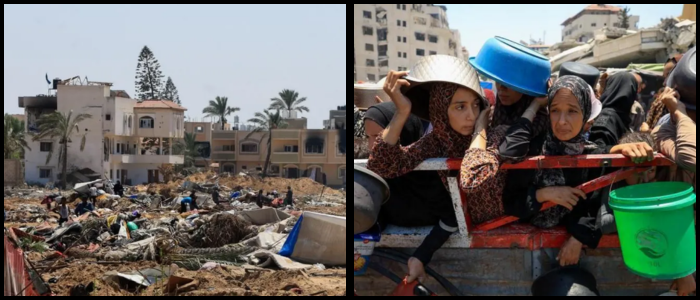The conflict has deeply altered the Middle East. Before the attack, Israeli Prime Minister Benjamin Netanyahu had focused on threats from Iran and worked toward normalising relations with Saudi Arabia, even allowing Qatari funds into Gaza to maintain short-term stability. In Washington, former U.S. President Joe Biden believed a historic Saudi-Israeli agreement was within reach. But those hopes crumbled in the wake of the deadly Hamas attack and Israel's military response, which has continued to draw widespread condemnation.
Concerns Over Civilian Suffering and Aid Denial
Since the war began, Israel has restricted access for foreign journalists to Gaza, relying mostly on Palestinian reporters, nearly 200 of whom have died while covering the conflict. Despite the limitations, reports of disproportionate military actions have emerged, including claims that tens of thousands of civilians have been killed and entire towns destroyed.
Critics highlight Israel's new aid delivery model—introduced by the Gaza Humanitarian Foundation to replace established systems—as worsening the crisis. A recent joint statement issued on 21 July by foreign ministers from the UK, European Union nations, Canada, Australia, New Zealand, and Japan described the situation as catastrophic. They condemned Israel's tactics, citing over 800 Palestinian deaths during attempts to access basic necessities like food and water.
They also called Israel's aid system "dangerous" and "inhumane," accusing the government of depriving people of essential humanitarian aid and violating international law. Britain's foreign secretary, David Lammy, echoed those sentiments in Parliament, though his remarks did little to calm criticism from within his own party. Several MPs expressed anger over the lack of decisive action and called for official recognition of a Palestinian state—an idea already endorsed by a majority of UN member states.
Political Struggles and Potential for Ceasefire
Meanwhile, Netanyahu is navigating intense political pressure at home. Israel's parliament, the Knesset, is days away from its summer recess, giving him a temporary reprieve from a possible no-confidence vote by far-right members of his coalition. These hardliners oppose any ceasefire and have threatened to leave the government if he engages in truce talks.
Netanyahu also faces legal pressure. He and his former defence minister are subjects of arrest warrants issued by the International Criminal Court, which is investigating alleged war crimes. While both deny wrongdoing, the international scrutiny continues to build. Israel also faces a separate legal case at the International Court of Justice over accusations of genocide, which it strongly denies, dismissing the claims as antisemitic.
Despite the grim outlook, a potential ceasefire could offer a brief opening for diplomacy, and hope for civilians and the estimated 20 remaining hostages believed to be alive in Gaza. Still, the underlying conflict remains unresolved, with deep historical tensions ensuring that peace remains elusive.
World

War Crime Allegations Mount in Gaza Conflict

Nearly two years into the Gaza conflict, Israel is facing increasing criticism from its closest allies, as mounting evidence points to possible war crimes. The war was sparked by Hamas's coordinated attack on Israel on 7 October 2023, killing 1,200 people—mostly civilians—and taking 251 hostages. While Hamas's actions were condemned as war crimes, international focus has shifted heavily toward Israel's ongoing military campaign and its severe humanitarian consequences in Gaza.















